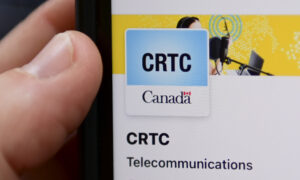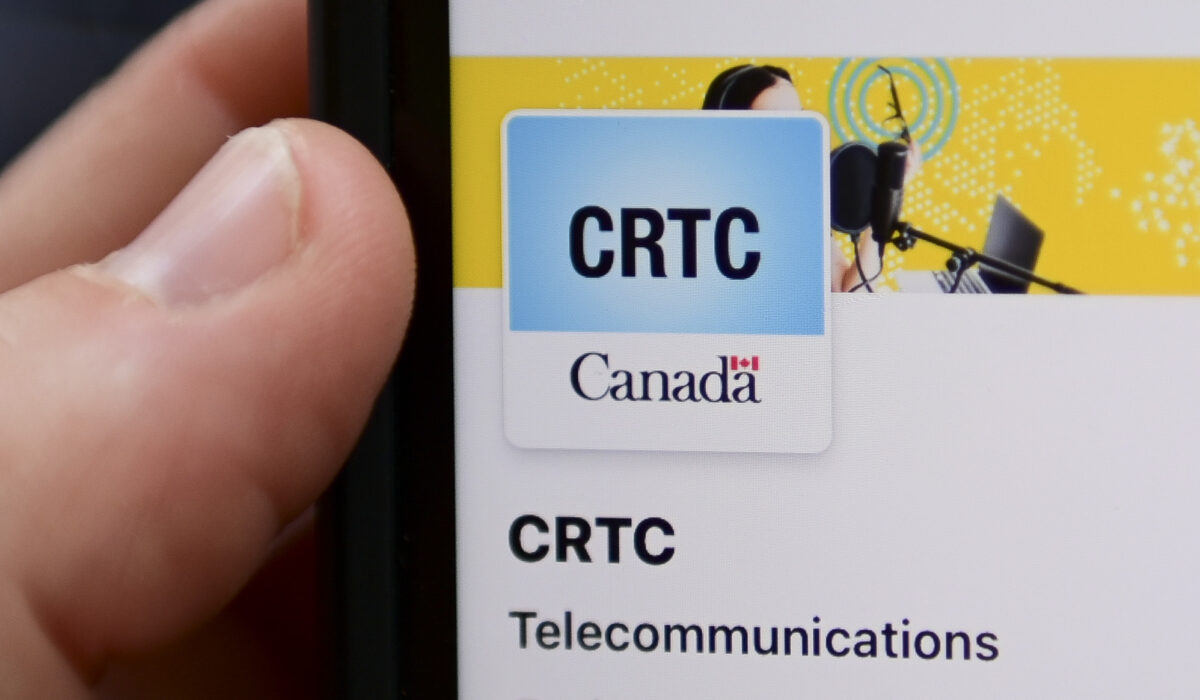
Commentary
The CRTC is best known as the Canadian content regulator. For the last half-century or so it has seen to it that Canadian productions, like “Anne of Green Gables,” and Canadian music artists were featured with sufficient regularity. (Those of us of a certain age would joke about having Anne Murray’s “Snowbird” seared into our skulls, it was played so often.)
The CRTC performs many other functions, but until very recently it was a creaky relic far removed from the everyday lives of Canadians.
But not anymore. Bill C-11 dusts off the CRTC and drags it onto centre stage. The federal government will use its nine government appointed members to take control of the internet, and virtually everything Canadians do online—which is a lot. The CRTC will even decide who can even qualify as a “credible news organization”—in close cooperation with the minister in charge, of course.
Barrels of ink are being spilled about this audacious attempted takeover of the internet. Court challenges are being organized. For example, Ezra Levant’s Rebel News is soliciting both volunteers and money in order to launch a focused challenge on a government move that he and others (like me) think is nothing short of the kind of Orwellian social control normally reserved for human prisons, like communist China and North Korea.
How these court challenges, and Conservative opposition moves, will turn out is anyone’s guess. But one question I haven’t yet heard asked is whether the CRTC—or at least its role as promoter of “Canadian values”—is even relevant anymore. After all, our own prime minister has declared that the version of Canada he leads is a “post national state, with no core identity.” How does one promote “Canadian values” if there is no such thing anymore?
I suspect the answer is that the Trudeau Liberals are really not that interested in making sure that Canadians are able to watch modern versions of “Anne of Green Gables,” or listen to “Snowbird” more often. Rather, this government wants to make sure that Canadians are exposed only to “acceptable views” and not “unacceptable views.” The newly revived government-controlled CRTC will see to that.
The prime minister explained why only Canadians with “acceptable views” should receive a hearing while the truckers’ convoy protest was playing out last winter. We saw how he dealt with people with “unacceptable views.” (For a dystopian description, read Tamara Lich’s new book, “Hold the Line.”) As for those who refused to be coerced into taking the COVID vaccine, Trudeau even famously asked, “Should we tolerate these people?” Clearly, he didn’t, and won’t. Only people who share his “acceptable views” will be tolerated on the new “Acceptable Views Internet.” So it should come as no surprise when we watch how the various Trudeau Liberal-appointed bodies will deal, summarily and brutally, with “unacceptable views.”
I said “bodies” because the CRTC is just the first of the new bureaucracies that this government has in mind to control the internet. Bill C-11 is the first of at least four new pieces of legislation that it expects to pass. It is just the “foot in the door” that lets the government decide what we will be allowed to see on the internet.
But C-11 does much more than open the door. It can also make things disappear. The CRTC will have the authority to alter, by algorithmic manipulation, the “discoverability” of items online. So, for example, your brilliant piece that is getting many views might have its “discoverability” altered. Instead of being on Google’s page 1 it can be moved to page 12—where no one goes. You have effectively been “disappeared.”
Government spokespeople say they have no intention of doing that, but these are the same people who invoked the Emergencies Act, with imprisonment and bank account seizures to deal with people and views the government found “unacceptable.” The newly energized CRTC is already busy at work deciding if Fox News should be banned in Canada. The authoritarian censorship is already starting.
So, C-11 opens the door. After it we will have C-18, C-36, and the Online Harms Act.
Bill C-18 will attempt to force internet giants, like Facebook, to bend to the government’s will and pay for content that has always been free. Will the giants do it, or, more likely, will you have to do without information that you have come to rely on—and not even notice that it is no longer there?
Bill C-36 gets even scarier. It lets us see what they have in mind for people with “unacceptable views”—what they will call “online hate.” This is the legislation that will allow the government to prosecute people with “unacceptable views.” They can be charged with crimes and prosecuted, even though they have not committed a known criminal offence. A person can even be prosecuted for what are really “thought crimes.” This isn’t “Orwellian”—it is Orwell. “Hateful online content” will be whatever the Trudeau Liberal-appointed commissioners say it is.
But if you think that the newly energized CRTC sounds a bit scary, what do you think of a “Digital Safety Commissioner”? Yes, that’s a real thing. The as-yet unnamed bill, known as “The Online Harms Act,” creates exactly that creature. This bill is truly an ugly piece of legislation that has no place in a liberal democracy. Obviously, regulation is necessary, but the bill in its present form is illiberal, it is authoritarian, and it has no place in Canada.
Now, if you are confident that you have only “acceptable views” you need not worry about any of this. But we know how the current radically ideological government thinks. So if you are a mother who wants to publicly object to her 12-year-old daughter being forced to share a bathroom or change-room with a fully intact naked adult male; someone who wants to voice your objection to a vaccine mandate; who publicly questions baseless stories about priests secretly burying indigenous residential school students; who doesn’t want children to be read to by drag queens in public libraries; or believes that “carbon zero” is bad policy—you should start to worry.
All of this proposed legislation is extremely complicated. There is no one person who understands all of it. Even the experts don’t know how even C-11, which has already been passed, will work. Perhaps I’m overly suspicious, but I suspect that they have deliberately made it unduly complicated so we won’t notice what they are up to. And the government has the gall to say “trust us.” Not me!
What is very clear is that the people pushing this radical internet-control legislation are absolutely determined to keep us from being exposed to those “unacceptable views.” Equally clear is that, in addition to routine regulation, partisans will have complete control to decide what is “acceptable” and what is “unacceptable.”
So, maybe we need to start paying attention. Maybe we need to read as much as we can on the subject, talk to our MPs, get involved in public discussions, and consider supporting Ezra’s, or someone else’s, court challenges.
Because if we sit back and just hope that someone is seeing to our best interests, we might end up living in some polite Canadian version of communist China, where we are not allowed to see “unacceptable views.”
And we won’t even know it.
Views expressed in this article are the opinions of the author and do not necessarily reflect the views of The Epoch Times.

















































